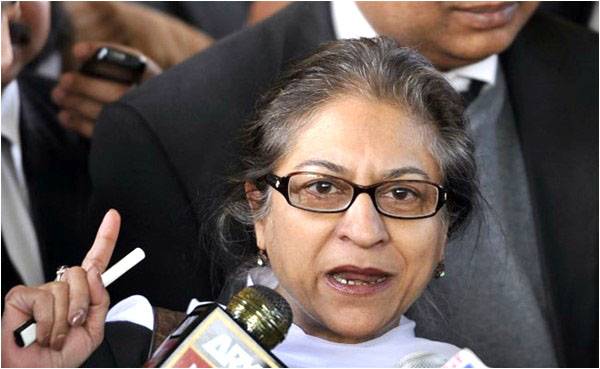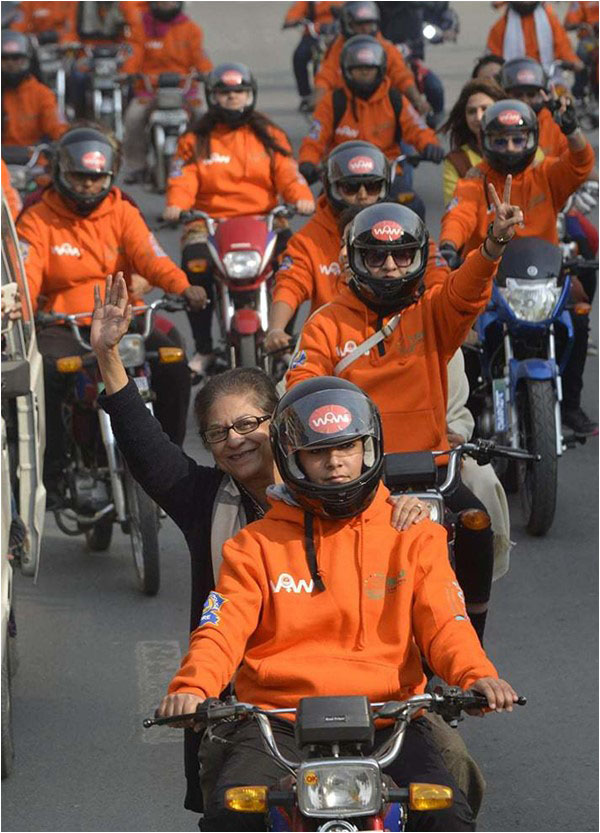
I A Rehman:
“In 1998, during the South Asian Convention on Human Rights, we found out that the National Assembly has passed a bill on the introduction of Shariah in Pakistan. We were all surprised and wondered how could they do it. Asma said to me, ‘Okay let’s go to the political parties and see to it that the Senate doesn’t pass it. She then went straight to Benazir Bhutto, who did not know that the bill had been passed. She then went to many other politicians and made sure that the bill didn’t even go to the Senate. That was her way of doing things – taking matters into her own hands.
She had her own way of doing things. Whenever there was a human rights meeting, she was the chair, the rapporteur, she would note the minutes, she would place the chairs, she rolled out the carpet… she would do everything.
She did everything.”
Seema Iftikhar:
“She was such a fiercely loyal friend, that you felt that she would be there – and she was there – in any situation that you needed help in. She was always available. The most sincere person that I know.
I’ve known her since school, when I was six years old. Very funnily, we became friends when both our fathers were in jail at the same time and the children would pick on us.
We’ve shared so much through our childhood, our youth, our time as young mothers. We had children at the same time, we started our careers at the same time – even though we had very, very different careers – but there was a bond that withstood time. I didn’t have to explain anything to her, she didn’t have to explain anything to me. You could just pick up where you left off.
The loss is irreplaceable. But my biggest regret is that I never got around to telling her how much I love her!”

Rabbya Shoaib:
“The state has a narrative; an incessant one that penetrates the masses reinforcing homogeneity and the state’s ‘binary codes’. More than the loss of an unparalleled boss, I mourn the loss of the only alternative voice available to the citizens of Pakistan.
When faced with funding crunches, civil society organisations call internal meetings to shortlist potential employees to terminate. Asma was the only Director that I have seen in my experience in the Human Rights sector to summon a meeting to evaluate how each and every employee could be accommodated by the organisation and by herself (personally) during the difficult period. She would care for everyone’s health, and for their financial and emotional state, despite her demanding schedule. She ensured that each and every one of her employees felt secure no matter what. Truly, truly a giant of humanity, be it in the smallest or the biggest of matters.”
Pervaiz Rasheed:
“I knew Asma for about 40 years. In this time there was Zia’s martial law, then Musharraf’s martial law, and whenever I got into trouble, she would take care of my family, my kids – she would be their strength. And she would do the same for the hundreds of others who faced persecution at the time. This requires massive human capacity, to take care of so many people.
When I got involved in the Dawn Leaks scandal, one day I was told at 6:30 am in the morning that Asma Jahangir is there to see me. Our homes are at a travel time of at least an hour, which means she had left at around 5:30 am, and would’ve woken up at 4:00 am. I asked her ‘Baji, what are you doing at this early hour?’. She said, ‘I was told you’d be leaving early, so I just dropped by to tell you that if you face trial, don’t hire a lawyer, I’ll fight your case myself’. This shows her knack for addressing her fellows’ troubles, even before they came to the fore.
What I learned from her, which was her defining quality, was her upholding of the rule of law – even for those whom she vehemently disagreed with. For instance, none of us would comment if anything illegal happened to religious extremists, but she would fight their case just as wholeheartedly as she would fight for those she agreed with.”
Afrasiab Khattak:
“A couple of days before Akbar Bugti was killed, in 2006, Asma Jahangir and I were on our way to Dera Bugti to see the situation over there and formulate a report. First, we flew from Lahore to Multan, and then we took a car, which we drove towards Dera Bugti. On our way we got attacked by a shower of bullets, when the car was passing through a deserted place.
Soon other cars started coming down the road, and the miscreants fled, but not for a single moment did Asma feel frightened. After being attacked, there would naturally be a feeling that maybe we ought to reconsider the trip, but she said to me, ‘They’re trying to stop us, now we absolutely need to go on.’ And we went on and met Akbar Bugti, a couple of days after which he was killed in the security operation.
But this is just one example of the courage and steadfastness that Asma Jahangir had in abundance. That was her driving force – that is what made her unstoppable and irreplaceable.”
“In 1998, during the South Asian Convention on Human Rights, we found out that the National Assembly has passed a bill on the introduction of Shariah in Pakistan. We were all surprised and wondered how could they do it. Asma said to me, ‘Okay let’s go to the political parties and see to it that the Senate doesn’t pass it. She then went straight to Benazir Bhutto, who did not know that the bill had been passed. She then went to many other politicians and made sure that the bill didn’t even go to the Senate. That was her way of doing things – taking matters into her own hands.
She had her own way of doing things. Whenever there was a human rights meeting, she was the chair, the rapporteur, she would note the minutes, she would place the chairs, she rolled out the carpet… she would do everything.
She did everything.”
Seema Iftikhar:
“She was such a fiercely loyal friend, that you felt that she would be there – and she was there – in any situation that you needed help in. She was always available. The most sincere person that I know.
I’ve known her since school, when I was six years old. Very funnily, we became friends when both our fathers were in jail at the same time and the children would pick on us.
We’ve shared so much through our childhood, our youth, our time as young mothers. We had children at the same time, we started our careers at the same time – even though we had very, very different careers – but there was a bond that withstood time. I didn’t have to explain anything to her, she didn’t have to explain anything to me. You could just pick up where you left off.
The loss is irreplaceable. But my biggest regret is that I never got around to telling her how much I love her!”

Rabbya Shoaib:
“The state has a narrative; an incessant one that penetrates the masses reinforcing homogeneity and the state’s ‘binary codes’. More than the loss of an unparalleled boss, I mourn the loss of the only alternative voice available to the citizens of Pakistan.
When faced with funding crunches, civil society organisations call internal meetings to shortlist potential employees to terminate. Asma was the only Director that I have seen in my experience in the Human Rights sector to summon a meeting to evaluate how each and every employee could be accommodated by the organisation and by herself (personally) during the difficult period. She would care for everyone’s health, and for their financial and emotional state, despite her demanding schedule. She ensured that each and every one of her employees felt secure no matter what. Truly, truly a giant of humanity, be it in the smallest or the biggest of matters.”
Pervaiz Rasheed:
“I knew Asma for about 40 years. In this time there was Zia’s martial law, then Musharraf’s martial law, and whenever I got into trouble, she would take care of my family, my kids – she would be their strength. And she would do the same for the hundreds of others who faced persecution at the time. This requires massive human capacity, to take care of so many people.
When I got involved in the Dawn Leaks scandal, one day I was told at 6:30 am in the morning that Asma Jahangir is there to see me. Our homes are at a travel time of at least an hour, which means she had left at around 5:30 am, and would’ve woken up at 4:00 am. I asked her ‘Baji, what are you doing at this early hour?’. She said, ‘I was told you’d be leaving early, so I just dropped by to tell you that if you face trial, don’t hire a lawyer, I’ll fight your case myself’. This shows her knack for addressing her fellows’ troubles, even before they came to the fore.
What I learned from her, which was her defining quality, was her upholding of the rule of law – even for those whom she vehemently disagreed with. For instance, none of us would comment if anything illegal happened to religious extremists, but she would fight their case just as wholeheartedly as she would fight for those she agreed with.”
Afrasiab Khattak:
“A couple of days before Akbar Bugti was killed, in 2006, Asma Jahangir and I were on our way to Dera Bugti to see the situation over there and formulate a report. First, we flew from Lahore to Multan, and then we took a car, which we drove towards Dera Bugti. On our way we got attacked by a shower of bullets, when the car was passing through a deserted place.
Soon other cars started coming down the road, and the miscreants fled, but not for a single moment did Asma feel frightened. After being attacked, there would naturally be a feeling that maybe we ought to reconsider the trip, but she said to me, ‘They’re trying to stop us, now we absolutely need to go on.’ And we went on and met Akbar Bugti, a couple of days after which he was killed in the security operation.
But this is just one example of the courage and steadfastness that Asma Jahangir had in abundance. That was her driving force – that is what made her unstoppable and irreplaceable.”

